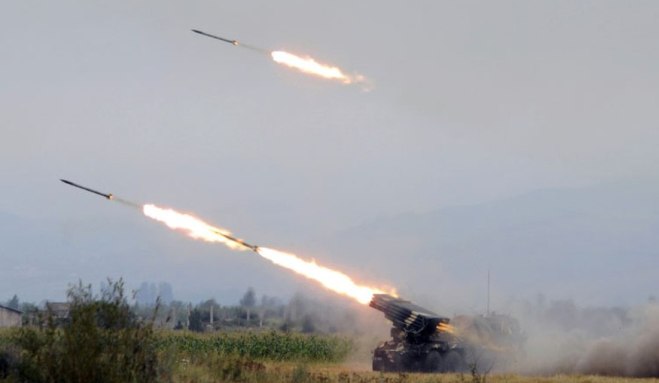EU blames Georgia for starting war with Russia

Georgian army rocket batteries firing on Ossetian cities and villages
Bruno Waterfield - Telegraph
Georgia "illegally" started last year's war with Russia but Moscow then "violated" international law by invading its neighbour in response to the attack, a European Union report has found.
An EU investigation into the roots of last August's conflict has reserved its harshest criticism for Georgia's military assault on the breakaway region of South Ossetia and its capital Tskhinvali.
"Open hostilities began with a large-scale Georgian military operation against the town of Tskhinvali and the surrounding areas, launched in the night of 7 to 8 August 2008, the report concluded.
"There is the question of whether the use of force by Georgia in South Ossetia was justifiable under international law. It was not."
Heidi Tagliavini, the Swiss diplomat who led the EU "mission", rejected Georgian claims that it was defending itself from an imminent Russian attack or violence from Moscow sponsored South Ossetian militias.
"None of the explanations given by the Georgian authorities in order to provide some form of legal justification for the attack lend it a valid explanation," she said.
Her report stated: "There was no ongoing armed attack by Russia before the start of the Georgian operation. Georgian claims of a large-scale presence of Russian armed forces in South Ossetia prior to the Georgian offensive could not be substantiated by the mission. It could also not be verified that Russia was on the verge of such a major attack."
Russia's military response to Georgia, the EU investigators found, was initially defensive, and legal, but quickly broke international law when it escalated into air bombing attacks and an invasion pushing into Georgia well beyond South Ossetia.
"In a matter of a very few days, the pattern of legitimate and illegitimate military action had thus turned around between the two main actors Georgia and Russia," said the report.
The five-day war left over 400 Georgian and South Ossetian civilians dead. Almost 200 Georgian servicemen were reported killed or missing, while Russian military casualties stand at 64.
While blaming "all sides" for war crimes, the EU report singled out Russian backed South Ossetian paramilitaries for "systematic looting and destruction of ethnic Georgian villages".
"Several elements suggest the conclusion that ethnic cleansing was indeed practised against ethnic Georgians in South Ossetia," it said.
More than 100,000 civilians on both sides were displaced at the height of the conflict. Several thousand South Ossetian civilians remain homeless and some 25,000 Georgians have been unable to return to South Ossetia.
In conclusion, the EU report, which runs to 1139 pages in three volumes, blamed the roots of the conflict on Russia's attempts to dominate its small neighbour and Georgia's sometime erratic responses to Moscow's aggression.
"(The evaluation) has to consider the impact of a great power's coercive politics and diplomacy against a small and insubordinate neighbour, together with the small neighbour's penchant for overplaying its hand and acting in the heat of the moment," the report concluded.
A UK Foreign Office spokesman welcomed the report. "This is not the time to apportion blame and stoke tensions," she said.
"We therefore urge all sides to exercise restraint in their response to the report and redouble their efforts on working towards a durable and peaceful solution."
Both Russia and Georgia have tried to claim that the EU report vindicates each of them
"The report proves that Russia was all the time preparing this war and August 7 and 8 were the culmination," said Temur Iakobashvili, a Georgian minister.
Natalya Timakova, the Kremlin's chief spokesman, said: "We can only welcome that the commission found that the war was started by Georgia."
Source: Telegraph